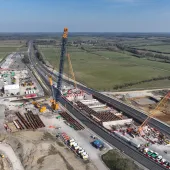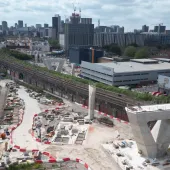HS2 begins Curzon Street Station foundations
Construction of Birmingham’s new Curzon Street Station, a key part of the HS2 high-speed rail project, has reached an important milestone with the installation of 2,000 underground concrete foundation columns. These piles will support the station's building and platforms, as well as the operational facilities in the basement.
A team of 80 workers, led by HS2’s contractor Mace Dragados Joint Venture (MDJV), is handling the foundation work on the 100,000 square metre site. The foundations are being created using three 30m-tall piling rigs, each weighing 95 tonnes.
Martyn Woodhouse, project director for MDJV, explained the significance of the work: “The start of foundation works for Curzon Street Station means we’re now entering a crucial stage of construction. The team has worked hard since January to prepare the site, and we’re now ready for the major piling operation that will form the base of the station.”
The majority of the concrete piles will support the station’s structure, with some interlocking piles forming the walls of the station’s basement. The piling work is expected to be completed by mid-2025, with further foundation work starting next year.
Richard Parker, Mayor of the West Midlands, visited the site and expressed his enthusiasm for the progress: “The work happening at Curzon Street Station is impressive, and it’s going to be a major part of our city’s future. It’s great to see local businesses winning contracts and new jobs being created across the region.”
Since work began on the site earlier this year, MDJV has completed significant earthworks and installed temporary platforms to prepare for the piling rigs. The concrete foundation work will also support a new retaining wall alongside the West Coast Main Line, protecting an adjacent Victorian wall.
Once complete, Curzon Street Station will improve connectivity in Birmingham, linking the city centre with local transport networks, including buses and trams. HS2 trains will also cut journey times between Birmingham and London to just 49 minutes.
The next phase of construction will include major procurement packages, offering further opportunities for local businesses to get involved in the project.







